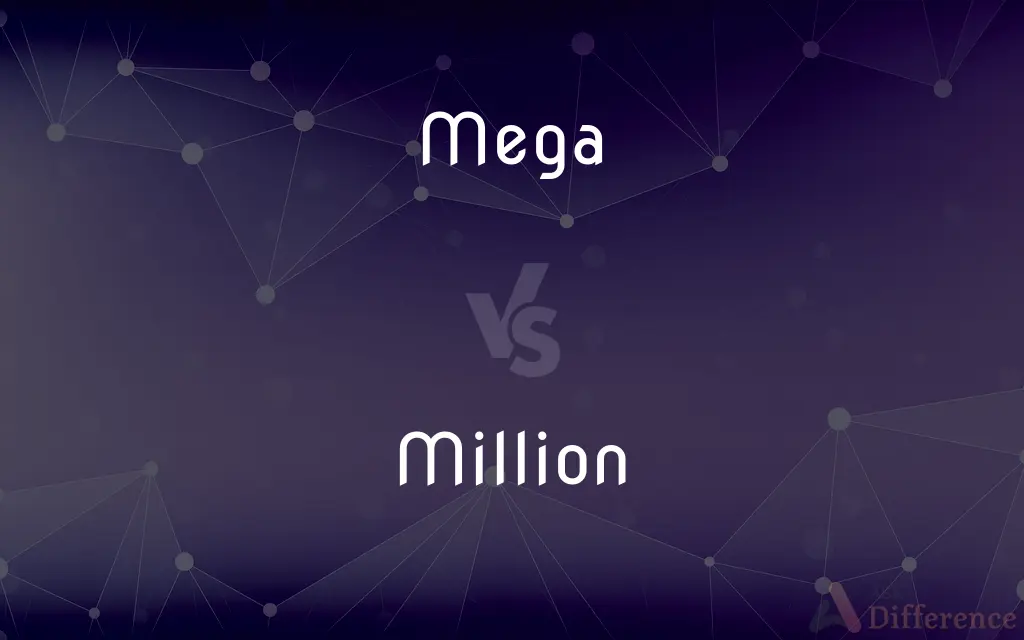Mega vs. Million — What's the Difference?
Edited by Tayyaba Rehman — By Fiza Rafique — Updated on April 4, 2024
Mega is a unit prefix in the metric system denoting a factor of one million (10^6), while a million is a numerical value representing 1,000,000.

Difference Between Mega and Million
Table of Contents
ADVERTISEMENT
Key Differences
Mega is a term often used in scientific and technical contexts to denote a multiplier of one million (10^6), as in megahertz (MHz) indicating one million hertz. On the other hand, a million is a cardinal number representing the numerical value 1,000,000, commonly used in general counting and financial contexts.
Mega is specifically applied as a prefix in the metric system, enhancing various units of measure such as megabytes (MB) for data size, whereas a million serves as a standalone figure without necessarily being attached to a unit of measurement. It's used broadly in everyday language to express quantity, from population figures to financial transactions.
In computing, mega often refers to a factor of 2^20 (1,048,576) when used with bytes, as in megabytes (MB), underscoring a slight difference from the strict mathematical definition of a million. Meanwhile, a million retains its precise value of 1,000,000 across all contexts, emphasizing a clear numerical threshold.
The significance of mega extends beyond numerical value, indicating a level of magnitude or scale in fields such as technology and science. A million, while indicative of a large quantity, lacks the specific context of scale or application inherent to the prefix mega.
In educational and scientific materials, mega is used to teach concepts of scale and measurement within the metric system, fostering a standardized understanding of magnitudes. A million, conversely, is often taught as a fundamental concept of large numbers in mathematics and financial literacy.
ADVERTISEMENT
Comparison Chart
Definition
A unit prefix in the metric system denoting a factor of 10^6.
A numerical value representing 1,000,000.
Context of Use
Scientific, technical, and computing.
General counting, financial, everyday language.
Relation to Measurement
Used as a prefix to units of measure.
Standalone number, not attached to a unit.
Numerical Representation
Often signifies 1,048,576 in computing contexts.
Strictly represents 1,000,000 in all contexts.
Conceptual Usage
Indicates magnitude or scale in specific fields.
Used to express large quantities broadly.
Compare with Definitions
Mega
Prefix denoting one million units in the metric system.
A megawatt (MW) is one million watts of electrical power.
Million
A number equivalent to 1,000,000.
The lottery jackpot reached ten million dollars.
Mega
Symbolized by 'M' in measurements.
The city's water treatment facility can process 2 Ml (megalitres) daily.
Million
Used to express a very large quantity or number.
Millions of stars can be seen on a clear night.
Mega
Used to signify large scale or magnitude in various contexts.
Megafauna refers to large or giant animals.
Million
Represents significant wealth or value.
He sold his startup for several million.
Mega
In computing, it often represents 2^20 (1,048,576) bytes.
This file is 5 megabytes (MB) in size.
Million
Indicates popularity or widespread usage.
Her book sold over a million copies in the first month.
Mega
Related to high levels of performance or quality in informal use.
That was a mega concert last night!
Million
A hyperbolic expression for a very large amount.
I've told you a million times to clean your room.
Mega
(informal) Very large.
Million
The cardinal number equal to 106.
Mega
(slang) Great; excellent.
Million
A million monetary units, such as dollars
Made a million in the stock market.
Mega
(informal) extremely
Mega-fun; mega rich
Million
Often millions An indefinitely large number
Millions of bicycles on the road.
Mega
(mathematics) The Steinhaus-Moser number ②
Million
Often millions The common people; the masses
Entertainment for the millions.
Million
The cardinal number 1,000,000: 106; a thousand thousand.
Million
An unspecified very large number.
I told you a million times before.
I can think of millions of reasons not to go.
Million
The number of ten hundred thousand, or a thousand thousand, - written 1,000,000. See the Note under Hundred.
Million
A very great number; an indefinitely large number.
Millions of truths that a man is not concerned to know.
Million
The mass of common people; - with the article the.
For the play, I remember, pleased not the million.
Million
The number that is represented as a one followed by 6 zeros
Million
(in Roman numerals, M written with a macron over it) denoting a quantity consisting of 1,000,000 items or units
Common Curiosities
Can the term million be used in scientific measurements?
Yes, as a numerical value, especially in data that involves counting or quantifying in large numbers.
How many zeros are in a million?
A million has six zeros (1,000,000).
How is mega represented in symbols?
Mega is represented by the symbol 'M', particularly in scientific and technical measurements.
Why does mega have two different values in computing and science?
In computing, binary system usage necessitates a slight deviation for practicality, while in science, it strictly follows the decimal system.
Do other prefixes similar to mega exist in the metric system?
Yes, other prefixes like kilo (thousand), giga (billion), and tera (trillion) denote other scales of measurement.
How has the usage of mega evolved in popular culture?
It's used to denote something extremely large, significant, or impressive beyond its scientific meaning.
What does mega stand for?
Mega is a unit prefix in the metric system denoting a factor of one million (10^6).
Is mega used only in scientific contexts?
Primarily, yes, especially in units of measurement and computing, though it can appear in other contexts to denote large scale.
What is the difference between megabytes and million bytes?
A megabyte technically refers to 1,048,576 bytes in computing, though often used interchangeably with one million bytes.
What areas of study frequently use the prefix mega?
Physics, engineering, and information technology are some fields that frequently use the prefix mega.
What is the significance of a million in financial terms?
It signifies a substantial sum of money, often associated with wealth, high-value transactions, or financial goals.
What makes a million a significant number in culture and society?
It's often associated with milestones, such as population counts, financial achievements, or expressing vast quantities in narratives.
Is mega ever used outside of the metric system?
Informally, yes, to denote something very large or significant in scale or impact, beyond its technical metric system use.
Can million and mega be used interchangeably?
Not directly; million is a numerical value, while mega is a prefix denoting a factor of a million in certain contexts.
Is a megawatt the same as a million watts?
Yes, a megawatt (MW) equals one million watts of power.
Share Your Discovery

Previous Comparison
Additional vs. Supplementary
Next Comparison
Lag vs. LogAuthor Spotlight
Written by
Fiza RafiqueFiza Rafique is a skilled content writer at AskDifference.com, where she meticulously refines and enhances written pieces. Drawing from her vast editorial expertise, Fiza ensures clarity, accuracy, and precision in every article. Passionate about language, she continually seeks to elevate the quality of content for readers worldwide.
Edited by
Tayyaba RehmanTayyaba Rehman is a distinguished writer, currently serving as a primary contributor to askdifference.com. As a researcher in semantics and etymology, Tayyaba's passion for the complexity of languages and their distinctions has found a perfect home on the platform. Tayyaba delves into the intricacies of language, distinguishing between commonly confused words and phrases, thereby providing clarity for readers worldwide.















































